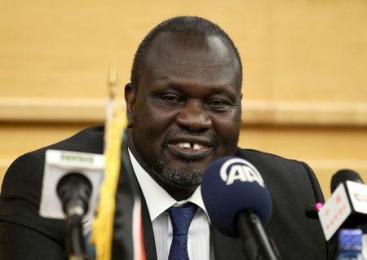S. Sudan’s Machar calls on UN to support implementation of peace deal
September 30, 2015 (NEW YORK) – South Sudan’s first vice-president designate, Riek Machar, has appealed to the United Nations (UN) to support the full implementation of the peace deal he signed in August with president Salva Kiir, stressing the need to mobilize resources in order to consolidate peace in the world’s youngest nation.

“I have come to express my commitment to the peace agreement that I signed on 17th August 2015 in Addis Ababa. Although the peace agreement has not met our comfortable minimum, we have accepted it and we are seriously propagating for its implementation amongst the South Sudanese both inside the country and in the diaspora,” Machar told the summit of the UN General Assembly.
He however pointed out potential challenges in the course of the implementation of the deal, including pending security issues, resources for assembling and cantonment of troops: their tents, food and water, etc., adding there is not yet an agreed understanding at the Addis Ababa military workshop about the demilitarization of Juba and other state capitals and major towns.
“There are pending security issues that were not addressed in the last workshop in Addis Ababa, particularly the determination of the sizes of the forces that will be deployed in Juba, Bor, Malakal, Bentiu and other major towns. There is no common understanding on interpretation of the demilitarization of Juba and the towns I mentioned above,” he told the world body.
“The ceasefire is not holding. I do not need to catalogue the violations as President Salva did. We are attacked and we get blamed,” he said.
He expressed his gratitude to AU Peace and Security Council for discussing the report of the AU Commission of Inquiry on South Sudan Conflict and for making the report public on the atrocities committed from 15 December 2013.
He said the political leadership in South Sudan “must realize collective responsibility” to repair the social fabric in the nation through the transitional justice process set forth in the recently signed agreement, saying this should aim to heal the emotional and physical wounds inflicted on the people by the destructive conflict.
“On my part and on behalf of the SPLM/SPLA (IO), I pledge to remain committed to consolidate peace in South Sudan and the region. Doing so paves the path for development and prosperity in the country,” he added.
He however stressed that there are no resources for dissemination of the peace agreement amongst the citizens inside the country and in diaspora, as well as for commencement of process of national reconciliation and healing during the pre-transitional period.
Machar also said it may not be possible for his advance team to travel to Juba due to lack of resources.
He also reminded that it was time to withdraw all the foreign forces such as the Uganda People’s Defence Forces (UPDF) and Sudanese rebel forces within the 45 days ultimatum and called on president Kiir to drop his reservations on the peace agreement.
He told the world gathering that South Sudan could possibly become the basket bread of the region in Africa if it got political vision.
“Your Excellency Mr. Secretary General, to conclude, many external observers and sometimes even South Sudanese themselves ask the question: is the young Nation South Sudan viable in the long run? Yes I tell them it is viable. Your Excellency, it is viable, what my country needs is not new forces but fresh ideas, a political vision and a road map,” he said.
Peace and security need to be restored, he said, adding; internally displaced persons (IDPs) and refugees to be repatriated and resettled; the country to be connected to itself and its neighbours by modern roads; build its national power grid to enhance development; as well as produce its own food.
“We hope to be the breadbasket of the region,” he concluded.
(ST)
